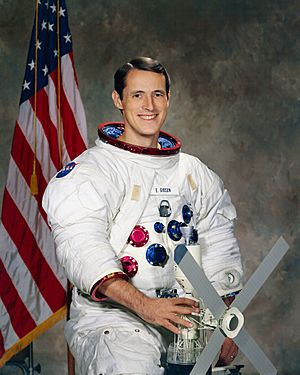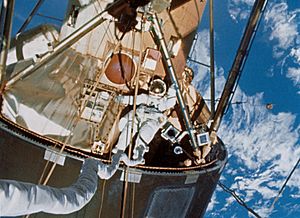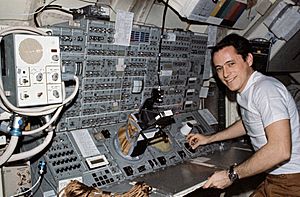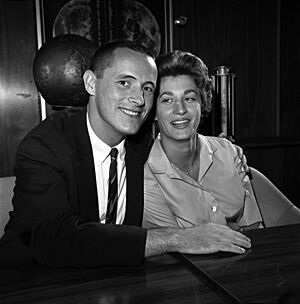Edward Gibson facts for kids
Quick facts for kids
Edward Gibson
|
|
|---|---|

Gibson with a Skylab model
|
|
| Born |
Edward George Gibson
November 8, 1936 Buffalo, New York, U.S.
|
| Awards | NASA Distinguished Service Medal |
| Space career | |
| NASA astronaut | |
|
Time in space
|
84d 1h 15m |
| Selection | NASA Group 4 (1965) |
|
Total EVAs
|
3 |
|
Total EVA time
|
15h 22m |
| Missions | Skylab 4 |
|
Mission insignia
|
 |
| Retirement | October 31, 1982 |
| Scientific career | |
| Thesis | Ionization Phenomena in a Gas-Particle Plasma (1964) |
Edward George Gibson (born November 8, 1936) is a former NASA astronaut, a skilled pilot, an engineer, and a physicist. He is best known for his time as a science pilot on the Skylab 4 mission.
Before joining NASA in 1965, Gibson studied at the University of Rochester and the California Institute of Technology. He worked as a research scientist, focusing on areas like jet propulsion. He was part of NASA Astronaut Group 4, which was the first group of astronauts chosen for their science backgrounds.
Gibson helped with the Apollo 12 Moon landing mission. Later, he played a big role in developing the Skylab space station. In 1973–74, he flew into space on Skylab 4. He, along with Commander Gerald P. Carr and Pilot William R. Pogue, spent over 84 days living and working in space. This was a record for how long people had stayed in space at that time. Edward Gibson is the last surviving crew member from the Skylab 4 mission.
Contents
Early Life and Education
Edward Gibson was born in Buffalo, New York, on November 8, 1936. When he was young, he had a bone infection called osteomyelitis. Thanks to new medicine like penicillin, he got better. To make his leg stronger, he played sports such as swimming, football, and track. Swimming was especially helpful for his leg. He was also active in the Boy Scouts of America.
Gibson finished high school in Kenmore, New York, in 1955. He then earned a Bachelor of Science degree in engineering from the University of Rochester in 1959. He continued his studies at the California Institute of Technology (Caltech). There, he received a Master of Science degree in engineering in 1960. In 1964, he earned his PhD in engineering with a focus on physics.
Early Career and Flying Experience
While at Caltech, Gibson worked as a research assistant. He studied jet propulsion and classical physics. He also wrote scientific papers about plasma physics and solar physics. Before joining NASA, he was a senior research scientist at Philco Corporation in California. There, he researched lasers and how light interacts with gases.
Edward Gibson is a very experienced pilot. He has flown for more than 4,300 hours. About 2,270 of those hours were in jet aircraft.
NASA Career and Space Missions
NASA chose Gibson as a scientist-astronaut in June 1965. He completed 53 weeks of flight training at Williams Air Force Base in Arizona. After this, he earned his Air Force pilot wings. He has flown different aircraft, including helicopters and the T-38 Talon jet.
Gibson was part of the support team for the Apollo 12 mission. He also worked as a CAPCOM, which means he was the main communicator between Mission Control and the astronauts in space. He was the first scientist-astronaut to get a crew assignment. He also helped design and test many parts of the Skylab space station. To prepare for Skylab, Gibson studied the Sun. He even wrote a textbook about the Sun called The Quiet Sun.
Skylab 4 Mission
Edward Gibson was the science pilot for Skylab 4. This was the third and final crewed mission to the Skylab space station. The mission launched on November 16, 1973, and ended on February 8, 1974. It was the longest space flight at that time, lasting 84 days, 1 hour, and 15 minutes.
Gibson flew with Commander Gerald P. Carr and Pilot William R. Pogue. During their time in space, they traveled 34.5 million miles. They successfully completed 56 experiments and 26 science demonstrations. They also did 13 student investigations. The crew took many pictures and gathered data about Earth's resources using Skylab's special cameras. Dr. Gibson was mainly in charge of operating the Apollo Telescope Mount. This telescope allowed them to make detailed observations of the Sun.
Gibson and his Skylab 4 teammates held the world record for individual time in space for several years. Gibson also performed three EVAs, or spacewalks. He spent a total of 15 hours and 22 minutes working outside the Skylab Orbital Workshop.
After NASA
After leaving NASA in 1974, Gibson continued his research on solar physics data from Skylab. He worked as a senior staff scientist. He also consulted on the design of the Spacelab in West Germany. In 1977, Gibson returned to NASA to help select and train new scientist-astronauts. He hoped to fly on another space station mission because of his Skylab experience. He retired from NASA for the last time on October 31, 1982.
After his second retirement from NASA, Gibson worked as a project manager for TRW. In 1990, he started his own consulting firm, Gibson International Corp. This company helps with program management and space infrastructure design.
Gibson has also written several books. These include a textbook on solar physics, two novels called Reach (1989) and In the Wrong Hands (1992), and he edited The Greatest Adventure (1994), a collection of stories from astronauts and cosmonauts. In 2025, his book Space: Ever Farther, Ever Faster was published. It talks about the history of space exploration and his experiences on Skylab 4.
Awards and Honors
Edward Gibson has received many special awards and honors throughout his career. He was given a National Science Foundation Fellowship and the R.C. Baker Fellowship at Caltech. He received the Johnson Space Center Certificate of Commendation in 1970.
In 1974, he received the City of New York Gold Medal and the City of Chicago Gold Medal, along with the other Skylab astronauts. He also received the FAI Yuri Gagarin Gold Medal in 1974. In 1976, he was awarded the U.S. Scientist Prize. He also received honorary doctorates from the University of Rochester and Wagner College in 1974.
The three Skylab astronaut crews, including Gibson, were awarded the 1973 Robert J. Collier Trophy. This award recognized their work in showing how important humans are for future space exploration. In 1974, President Nixon gave the Skylab 4 crew the NASA Distinguished Service Medal. The American Astronautical Society gave them the 1975 Flight Achievement Award. The Federation Aeronautique Internationale awarded the Skylab 4 crew the De La Vaulx Medal and V. M. Komarov Diploma for 1974.
In 1997, Edward Gibson was inducted into the U.S. Astronaut Hall of Fame.
Personal Life
Edward Gibson is married to Julianne Volk. They have four children: Jannet Lynn (born 1960), John Edward (born 1964), Julie Ann (born 1968), and Joseph Michael (born 1971).
Media Appearances
In the 1998 HBO miniseries From the Earth to the Moon, Edward Gibson was played by actor Geoffrey Nauffts.
See also
 In Spanish: Edward Gibson para niños
In Spanish: Edward Gibson para niños
 | Sharif Bey |
 | Hale Woodruff |
 | Richmond Barthé |
 | Purvis Young |




